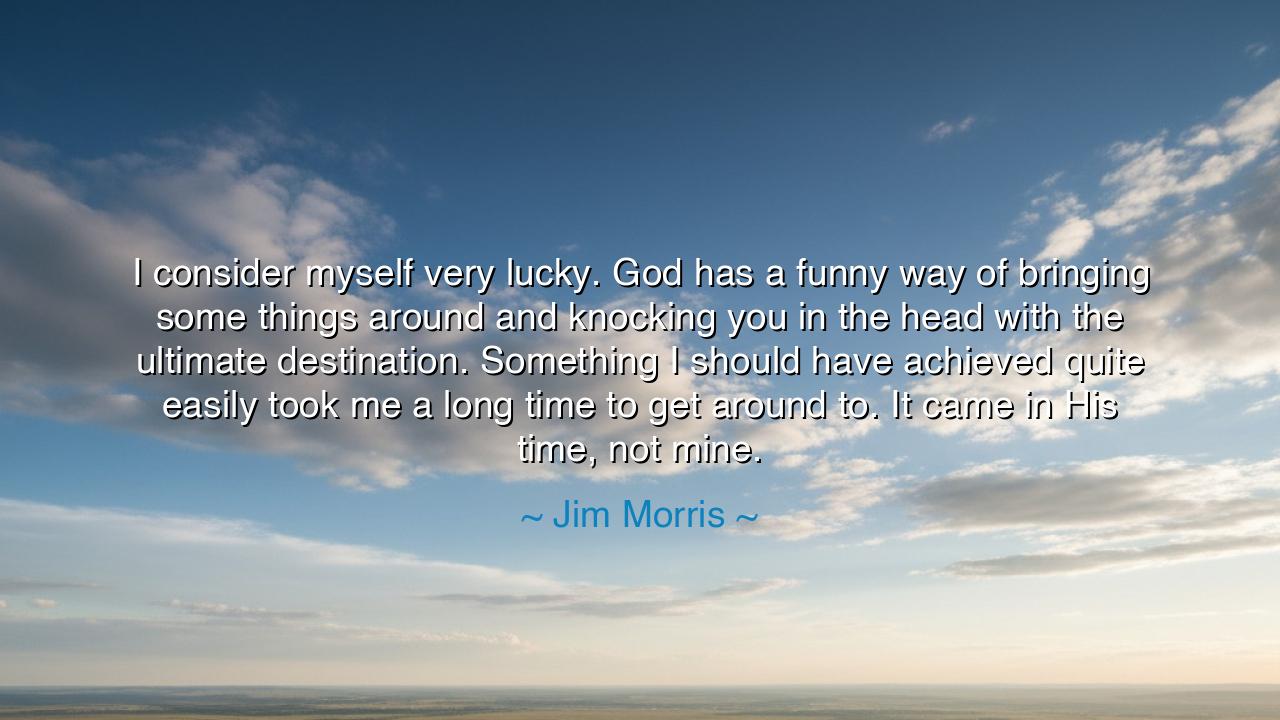
I consider myself very lucky. God has a funny way of bringing
I consider myself very lucky. God has a funny way of bringing some things around and knocking you in the head with the ultimate destination. Something I should have achieved quite easily took me a long time to get around to. It came in His time, not mine.






When Jim Morris declared, “I consider myself very lucky. God has a funny way of bringing some things around and knocking you in the head with the ultimate destination. Something I should have achieved quite easily took me a long time to get around to. It came in His time, not mine,” he spoke as one who had wrestled with time, with faith, and with the mysterious rhythm of destiny. His words do not rise from easy triumph but from the soil of waiting, of detours, of dreams deferred. In this confession lies the eternal wisdom of the ancients: that man’s plans are but sketches before the vast canvas of divine timing.
Morris’s life itself is the living parable behind the quote. Once a young pitcher with a blazing arm and great promise, he was derailed by injury and disappointment before he could reach the major leagues. Years later, after giving up the dream, he found himself a high school teacher and baseball coach, older and seemingly far removed from the fields of glory. But when he challenged his students to chase their dreams, they turned the lesson upon him: “You too, coach—try again.” And so, in humility, he did. Against all odds, in his mid-thirties—a time when most athletes fade—he tried out once more and earned his place in the Major Leagues. The dream that should have been his youth’s reward became his life’s redemption. That was when he realized the truth: it had come not in his time, but in God’s time.
To those of the modern age, impatient and restless, these words are a gentle rebuke. We believe that effort alone should bend destiny to our will, that talent should ripen without delay. But Morris reminds us of an older truth—one known by prophets, poets, and warriors alike—that the divine clock does not answer to human haste. There are seasons for planting and seasons for harvest, but the soil of the soul matures only through waiting. The delay we curse may be the very training we need to bear the weight of our blessing.
Consider the story of Moses, who spent forty years in exile before leading his people to freedom. In his youth, he was fiery and impulsive, ready to act in his own strength—and so he failed. Only in his age, tempered by humility, did God send him back to fulfill his purpose. The miracle of deliverance did not come when Moses wanted it, but when he was ready for it. Such is the hidden pattern of providence: the path that feels delayed is often the one that delivers us to ourselves.
When Morris speaks of being “knocked in the head with the ultimate destination,” he captures the divine humor that the ancients called irony. We walk in circles, chasing what we think is lost, only to discover that it has been waiting for us all along. Life has a way of humbling those who hurry and healing those who endure. What we call misfortune may be nothing more than the careful hand of God rearranging our path. Luck, as Morris calls it, is often just grace disguised as coincidence.
To understand this truth is to live with peace. It does not mean surrendering to idleness, but learning to trust the unseen. The wise do not stop striving, but they do stop forcing. They work with faith, not fear. For every delay has its reason, every unanswered prayer its season. The gift that comes too soon may destroy, but the gift that comes in His time transforms. The divine gardener knows when the fruit is ripe; to pluck it early is to spoil the sweetness that patience prepares.
So take this teaching, O listener, and bind it to your heart: Do not despair when the road winds longer than you planned. Do not measure success by speed, but by surrender. For when you walk with faith, even your delays become blessings in disguise. Be steadfast, but not anxious; diligent, but not demanding. The universe will unfold when your soul is ready to receive what your hands have longed to hold. And when it comes—when the long-awaited promise finally arrives—you will see, as Jim Morris saw, that it did not come too late, nor too early, but precisely in the appointed hour. It came, as all things worthy do, in His time, not yours.






AAdministratorAdministrator
Welcome, honored guests. Please leave a comment, we will respond soon